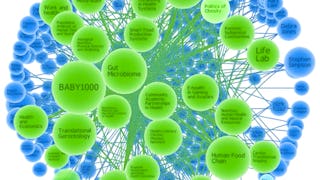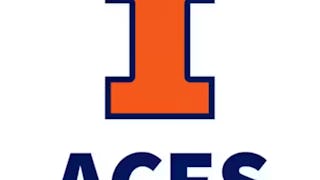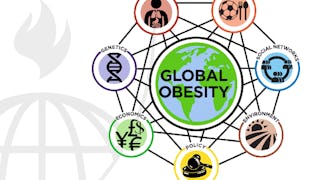Filter by
SubjectRequired
LanguageRequired
The language used throughout the course, in both instruction and assessments.
Learning ProductRequired
LevelRequired
DurationRequired
SkillsRequired
SubtitlesRequired
EducatorRequired
Explore the Obesity Course Catalog
 Status: Preview
Status: PreviewThe University of Edinburgh
Skills you'll gain: Scientific Methods, Student-Centred Learning, Health Disparities, Research, Nutrition and Diet, Behavioral Health, Peer Review, Psychology, Stress Management, Physiology, Discussion Facilitation
 Status: Preview
Status: PreviewThe University of Sydney
Skills you'll gain: Chronic Diseases, Social Determinants Of Health, Systems Thinking, Epidemiology, Public Health and Disease Prevention, Public Health, Health Care, Preventative Care, Socioeconomics, Health Policy, Medical Science and Research, Nutrition and Diet, Biology, Psychology
 Status: NewStatus: Free Trial
Status: NewStatus: Free TrialUniversity of Illinois Urbana-Champaign
Skills you'll gain: Health Equity, Health Disparities, Social Determinants Of Health, Nutrition and Diet, Good Manufacturing Practices, Food Quality Assurance And Control, Nutrition Education, AI Personalization, Food Safety and Sanitation, Policy Development, Clinical Nutrition, Regulatory Affairs, Public Health, Regulatory Compliance, Health Policy, Health Informatics, Advocacy, Health Assessment, Health Technology, Microbiology
 Status: NewStatus: Preview
Status: NewStatus: PreviewUniversidad Nacional Autónoma de México
Skills you'll gain: Nutrition and Diet, Nutrition Care Plans, Meal Planning And Preparation, Nutrition Education, Nutritional Assessment, Adaptability
 Status: Preview
Status: PreviewJohns Hopkins University
Skills you'll gain: Systems Thinking, Epidemiology, Social Network Analysis, Simulations, Network Analysis, Public Health, Agentic systems, Social Determinants Of Health, Behavioral Health, Economics, Software Installation
 Status: NewStatus: Free Trial
Status: NewStatus: Free TrialNational Academy of Sports Medicine
Skills you'll gain: Stress Management, Medical Nutrition Therapy, Behavioral Health, Mental and Behavioral Health Specialties, Psychosocial Assessments, Mental Health, Exercise Science, Social Determinants Of Health, Nutritional Assessment, Social Sciences, Nutrition and Diet, Cognitive Behavioral Therapy, Health And Wellness Coaching, Kinesiology, Medical Devices, Nutrition Counseling, Coaching, Clinical Nutrition, Physical Stamina, Health Assessment
What brings you to Coursera today?
 Status: Free Trial
Status: Free TrialRice University
Skills you'll gain: Pulmonology, Obstetrics And Gynecology, Respiration, Anatomy, Urology, Cardiology, Urinalysis, Patient Evaluation, Immunology, Hematology, Hemodynamics, Nephrology, Capillary, Gynecology, Physiology, Pathology, Clinical Nutrition, Medical Terminology, Biology, Lifelong Learning
 Status: Preview
Status: PreviewEmory University
Skills you'll gain: Nutrition and Diet, Physiology, Stress Management, Health And Wellness Coaching, Behavioral Health, Biology, Mindfulness, Resilience, Exercise Science
 Status: Preview
Status: PreviewYale University
Skills you'll gain: Health Promotion, Health Education, Health And Wellness Coaching, Nutrition and Diet, Public Health, Behavioral Health, Social Determinants Of Health, Community Health, Mental Health, Behavioral Economics, Physical Therapy, Goal Setting
 Status: Free Trial
Status: Free TrialUniversity of Michigan
Skills you'll gain: Health Disparities, Health Equity, Social Determinants Of Health, Community Health, Public Health, Health Policy, Health Promotion, Health Assessment, Social Justice, Economics, Policy, and Social Studies, Epidemiology, Socioeconomics, Health Systems, Cultural Responsiveness, Stress Management, Health Care, Mental and Behavioral Health, Data Collection, Preventative Care, Diversity Equity and Inclusion Initiatives
 Status: Preview
Status: PreviewStanford University
Skills you'll gain: Cooking, Meal Planning And Preparation, Nutrition and Diet, Health Education, Food and Beverage, Behavioral Health, Chronic Diseases, Health Informatics
 Status: Free Trial
Status: Free TrialNational Academy of Sports Medicine
Skills you'll gain: Nutrition and Diet, Exercise Science, Sports Medicine, Nutrition Education, Physiology, Endocrinology, Stress Management, Biochemistry, Biology
Obesity learners also search
In summary, here are 10 of our most popular obesity courses
- Understanding Obesity: The University of Edinburgh
- Easing the burden of obesity, diabetes and cardiovascular disease: The University of Sydney
- Personalized Nutrition, Policy, and Food Regulations: University of Illinois Urbana-Champaign
- Planes alimentarios para todos : Universidad Nacional Autónoma de México
- Systems Science and Obesity: Johns Hopkins University
- Holistic Weight Management: National Academy of Sports Medicine
- Human Anatomy & Physiology II: Rice University
- Weight Management: Beyond Balancing Calories: Emory University
- Health Behavior Change: From Evidence to Action: Yale University
- The Influence of Social Determinants on Health: University of Michigan










